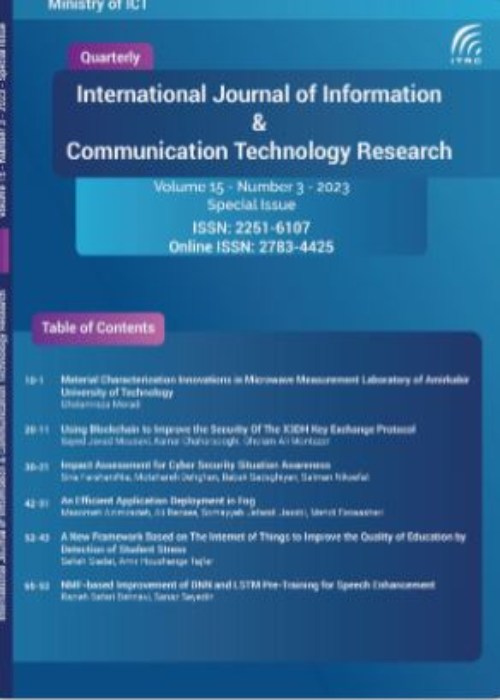فهرست مطالب

International Journal Information and Communication Technology Research
Volume:2 Issue: 2, Spring 2010
- تاریخ انتشار: 1389/12/03
- تعداد عناوین: 7
-
-
Page 1This paper presents a novel Texture-Edge Descriptor, TED, for background modeling and pedestrian detection in video sequences which models texture and edge information of each image block simultaneously. Each block is modeled as a group of adaptive TED histograms that are calculated for pixels of the block over a rectangular neighborhood. TED is an 8-bit binary code which is independent of the neighborhood size. Experimental results over real-world sequences from PETS database clearly show that TED outperforms LBP.
-
Page 9This paper presents a set of voice activity detection (VAD) methods, that are easy to implement, robust against noise, and appropriate for real-time applications. The common characteristic is the use of a voting paradigm in all the proposed methods. In these methods, the decision on the voice activity of a given frame is based on comparing the features obtained from that frame with some thresholds. In the first method, a set of three features, namely frame energy, spectral flatness, and the most dominant frequency component is applied. In the second approach however, the spectral pattern of the frames of vowel sounds is used. To use the strengths of each of the above methods, the combination of these two decision approaches is also put forth in this paper. The performance of the proposed approaches is evaluated on different speech datasets with different noise characteristics and SNR levels. The approaches are compared with some conventional VAD algorithm such as ITU G. 729, AMR and AFE from different points of view. The evaluations show considerable performance improvement of the proposed approaches.
-
Page 21In the foreseeable future, networks of access devices that can cooperate and effectively communicate with military backbone infrastructure will significantly influence and simplify military operations. As one of the promising solutions for developing next generation military networks, Ethernet Passive Optical Network (EPON) has received great attention from both industry and academia in recent years. Based on the EPON technology, bandwidth constraint is a critical issue in military communication. In this paper we propose Peris, a novel dynamic bandwidth allocation method with second price auction in next generation military networks based on EPON technology. In this new method, the OLT (similar to the leaders) is responsible for the auction management which effectively and fairly responds to the bandwidth requests of the users through their own ONUs and allocates the winners the amount of requested available bandwidth. Simulation results show that comparing Peris with IPACT, regarding QoS parameters such as packet loss ratio, line utilization and throughput, it has better performance.
-
A New GA Approach Based on Pareto Ranking Strategy for Privacy Preserving of Association Rule MiningPage 29With fast progress of the networks, data mining and information sharing techniques, the security of the privacy of sensitive information in a database becomes a vital issue to be resolved. The mission of association rule mining is discovering hidden relationships between items in database and revealing frequent itemsets and strong association rules. Some rules or frequent itemsets called sensitive which contains some critical information that is vital or private for its owner. In this paper, we investigate the problem of hiding sensitive knowledge. We decide to hide sensitive knowledge both in frequent patterns and association rule extraction steps. In order to conceal association rules and save the utility of transactions in dataset, we select Genetic Algorithm to find optimum state of modification. In our approach various hiding styles are applied in different multi-objective fitness functions. First objective of these functions is hiding sensitive rules and the second one is keeping the accuracy of transactions in dataset. After sanitization process we test the sanitization performance by evaluation of various criterions. Indeed our novel framework consists of dataset preprocessing, Genetic Algorithm-based core approach and different sanitizing measurements. Finally we establish some experiments and test our approach by larger datasets and compare the performance with well-known existing ones.
-
Page 43Web services are the inseparable part of many scientific applications. Consider communication between two partial differential equation (PDE) solvers on different domains, such applications work by exchanging large arrays containing floating point data with high accuracy. The reliance of web services on SOAP leads to performance degradation in similar scenarios as the serialization of outgoing messages containing large arrays of doubles is a primary SOAP performance bottleneck.Various aspects of this problem are examined from the point of views including alternative formats, XML coding compression, differential serialization, differential de-serialization, etc. This paper proposes an approach which combines the idea behind differential serialization and differential de-serialization with a completely different implementation.
-
Page 51In this article, an attempt to introduce the first Persian context sensitive spell checker, which tries to detect and correct the real-word spelling error of Persian text is presented. The proposed method is a statistical approach which uses Bayesian framework as its probabilistic model and also uses mutual information metric as a semantic relatedness measure between different Persian words. Our experiments on sample test data, shows that accuracy of correction method is about 80% with respect to F1-measure.
-
Page 61In this paper we show how the classical and modern adaptive filter algorithms can be introduced in a unified way. The Max normalized least mean squares (MAX-NLMS), N-Max NLMS, the family of SPU-NLMS, SPU transform domain adaptive filter (SPU-TDAF), and SPU subband adaptive filter (SPU-SAF) are particular algorithms are established in a unified way. Following this, the concept of set-membership (SM) adaptive filtering is extended to this framework, and a unified approach to derivation of SM and SM-SPU adaptive filters is presented. The SM-NLMS, SM-TDAF, SM-SAF, SM-SPU-NLMS, and SM-SPUSAF are presented based on this approach. Also, this concept is extended to the SPU affine projection (SPU-AP) and SPUTDAF algorithms and two new algorithms which are called SM-SPU-AP and SM-SPU-TDAF algorithms, are established. These novel algorithms are computationally efficient. The good performance of the presented algorithms is demonstrated in system identification application.


